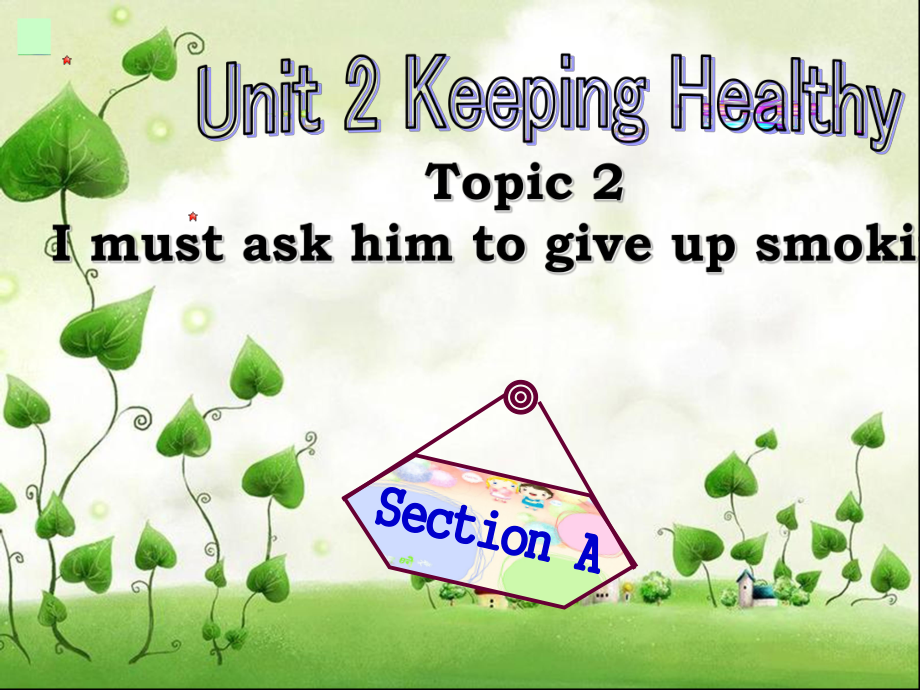《仁愛版八年級上冊 Unit 2 Topic 2 Section A 課件(共 24 張ppt)》由會員分享�����,可在線閱讀�����,更多相關(guān)《仁愛版八年級上冊 Unit 2 Topic 2 Section A 課件(共 24 張ppt)(24頁珍藏版)》請在裝配圖網(wǎng)上搜索���。
1、Section A 八 年 級 Unit 2 Topic 2 Section ATeaching aims教 學(xué) 目 標(biāo) Knowledge aims: 語 言 知 識 1. 能 正 確 運 用 動 名 詞 短 語 做 主 語 描 述 好 壞 生 活 習(xí) 慣 �����。 Staying up late is bad for your health. 2. 能 正 確 運 用 must, mustnt提 出 對 養(yǎng) 成 好 習(xí) 慣 的 建 議 ���。 You must have a good rest. / You mustnt throw litter around. Skill aims: 語 言 技
2�����、能 1. 能 聽 懂 有 關(guān) 影 響 健 康 的 好 習(xí) 慣 和 壞 習(xí) 慣 的 對 話 �。 2. 能 熟 練 地 運 用 must, mustnt說 出 對 好 壞 生 活 習(xí) 慣 的建 議 。 3. 能 正 確 朗 讀 有 關(guān) 影 響 健 康 的 好 習(xí) 慣 和 壞 習(xí) 慣 的 對 話或 文 章 �。 Emotional aims: 情 感 態(tài) 度 1. 通 過 語 言 學(xué) 習(xí) 、 討 論 �����、 了 解 他 人 生 活 習(xí) 慣 ���, 影 響 學(xué)生 自 身 品 格 ����, 學(xué) 會 辨 別 好 壞 習(xí) 慣 ����, 正 面 認(rèn) 識 事 物 。 2. 幫 助 學(xué) 生 養(yǎng) 成 好 習(xí) 慣 ����, 戒 掉 壞 習(xí) 慣
3、, 保 持 健 康 的 生活 方 式 �。 New words疲倦的,疲勞的 引起�����,導(dǎo)致廢棄物����,垃圾垃圾箱指甲一餐(飯)沒有,缺乏tiredcauselitterdustbinfingernailmealwithout Kangkang looks tired.What did he do last night?疲 倦 的 Listen to 1a and find out the answers.1a錄音1a-P351. Whats wrong with Kangkang?2. Did he watch a soccer game on TV last night?3. Is staying
4��、up late good for your health?He has a headache.Yes, he did. No, it isn t. Watch the flash and fill in the blanks.1bReasonwatch _go to bed _ Result look _have a _Suggestion go to bed _Feeling _ a soccer game very late tiredheadacheearly better視頻1a-P35 Look and say.Jane:Kangkang:Jane:Kangkang: Kangkan
5��、g, you look tired. Whats wrong?I have a headache.Im sorry to hear that. What caused it?I watched a soccer game on TV last night and went to bed very late.1a I see. Staying up late is bad for your health. You should go to bed early and youll feel better tomorrow.Right! I must have a good rest.Jane:Ka
6���、ngkang: Language points1. look tired look happy look sad look excited look angry look sleepy系動詞 看起來adj.作表語 Language points2. What caused it?提 重 物 會 導(dǎo) 致 背 疼。Lifting heavy things will cause a backache.吃 太 多 糖 可 能 導(dǎo) 致 牙 疼�����。Eating too much candy may cause a toothache. 3. Staying up late is bad for your h
7����、ealth. - Is staying up late bad for your health?- Yes, it is.- Is staying up late good or bad for your health?- It is bad.Language points G oing to bed early is good for our health.G etting up late is bad for our health.Doing morning exercises is good.Keeping fingernails long is bad. Washing hands b
8、efore meals is good.Playing sports right after meals is bad. G oing to school without breakfast is bad. Brushing teeth twice a day is good.Is it good or bad for our health?謂語動詞用單數(shù) Jane: Kangkang, you _. Whats wrong?Kangkang: I have a headache.Jane: _. What caused it?Kangkang: I _ a soccer game on TV
9、 last night and _.Jane: I see. _ bad for your health.You should go to bed early and youll _ tomorrow.Kangkang: Right! I _.look tiredIm sorry to hear thatwatchedwent to bed very lateStaying up late isfeel better must have a good rest Work in pairs and practice 1a. Then fill in the blanks and make a n
10�����、ew conversation with your partner.1d have a stomachache see a doctorstay up late go to bed earlydo much homework have a rest Make similar conversations after the example. Then act it out in pairs.A: I feel bad because I have a stomachache.B: Oh, eating too much is bad for your health. You must see a
11�����、 doctor. Match the sentence halves with the pictures. You should/mustYou mustnt / shouldntDont stay up late at night.read in the sun.put litter into the dustbin.do morning exercises every day.throw litter around.brush your teeth twice a day.Read and match. Good Bad 1. going to bed early 2. getting u
12�、p late 3. doing morning exercises 4. keeping fingernails long 5. washing hands before meals 6. playing sports right after meals7. going to school without breakfast 8. brushing teeth twice a day Check whether the following habits are good or bad. _ _ _ _We should get up early.We mustnt keep fingernai
13、ls long.We mustnt play sports right after meals.We should have breakfast before we go to school.Rewrite the bad habits, using should, had better or must. Ask and answer the questions based on 3a. Then list some other living habits and discuss them.Example:A: Is getting up late good or bad for our he
14�、alth?B: Its bad.A: Really? I must get up early every day. Use expressions like “Really?” “How interesting!” “My God!” “Wow!” etc. to show your attitude in conversations. Learn to talk about personal hygiene and living habits.2. Learn the modal verbs: must/mustnt. 1.模 仿 1a 編 寫 一 段 類似 的 對 話 , 至 少 60詞 ����。2.列 舉 出 五 種 對 身 體 健康 有 益 的 生 活 習(xí) 慣 。
 仁愛版八年級上冊 Unit 2 Topic 2 Section A 課件(共 24 張ppt)
仁愛版八年級上冊 Unit 2 Topic 2 Section A 課件(共 24 張ppt)

